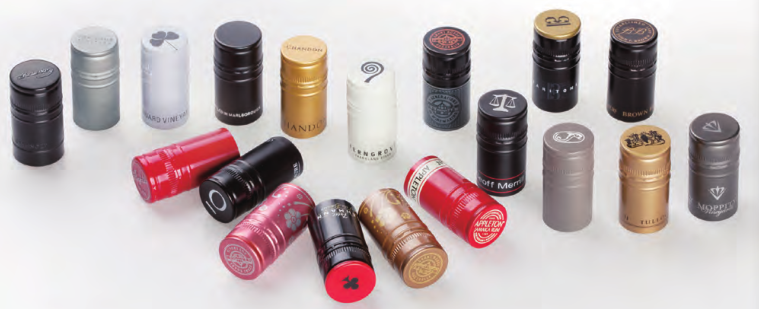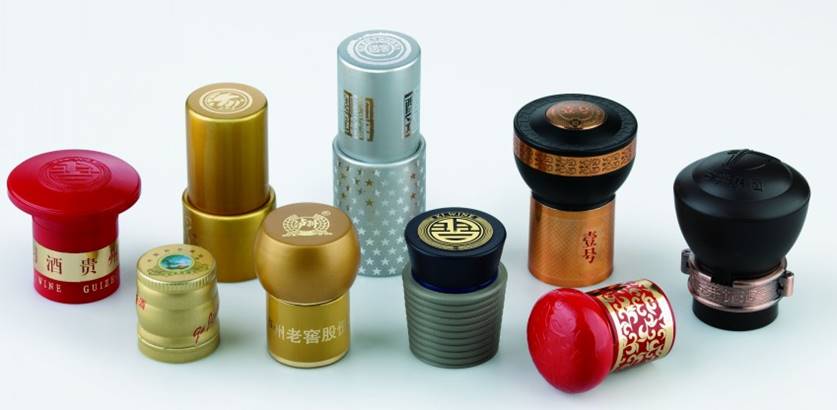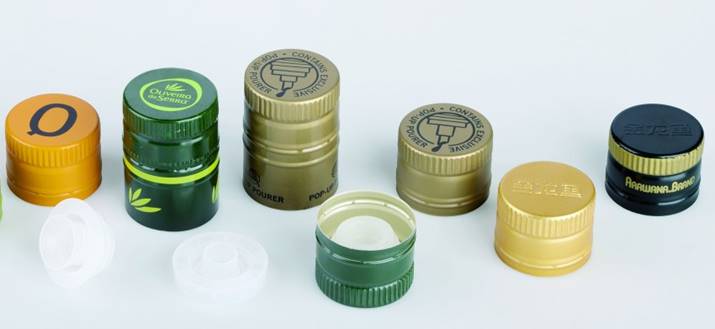With the exquisite techniques, innovative crafts and large scale production line, Hicap Closrues provides clients with high quality packaging solutions and services,not only strengthening the anti counterfeiting function, but also make the whole packaging image to be more premium.
Wine Screwcaps (30x60, 31.5x60, 30x44, 25x43, Tin Saran liner, Saranex liner)
Hicap Closures Wine screwcaps have been adopted by leading wine manufacturers in many coutries due to the benefits they offer with respect to traditional corks: they have no impact on the organoleptic qualities of the wine, avoiding oxidation and the so-called `cork taint`.
The wine lasts longer over time and its delicate balance does not change when transported.
Hicap Closures screwcaps make the bottle easier to open and to re-seal, maintaining the quality and the taste of the wine for longer. The screwcaps can be personalised with a variety of decoration techniques to meet the customer`s brand and marketing requirements.
Spirits Closures (33x57, 33x47, 31.5x44, 31.5x50 etc.)
Hicap Closures is the world leader in the production of non-refillable closures and in anti-counterfeiting technologies, with 10 billion closures sold each year.
Technological innovation has provided spirits manufacturers with packaging solutions that make the counterfeiting of packaging increasingly difficult, enabling them to protect their brand image.
Current solutions encompass an infinite number of non-refillable pourers with different levels of protection; non-refillable valve systems and tamper-evident systems.
We are able to design totally customised closures in an infinite range of colours, shapes, sizes and materials to meet the needs of customers and to enhance brand image.
Oil and Water Closures (31.5x24, 31.5x44)
Hicap Closures provides a diversified range of caps, both short and long, with pourers that have been specifically designed for the viscosity of the oil, with a view to enabling perfect pouring, as well as anti-drip devices to avoid the drips that could form when pouring is interrupted.
Spirits Closures,Closure For Liquor,Screw Top Wine,Aluminium Closures,High quality Spirits metal cover, Liquor metal lids Yantai Hicap Closures Co., Ltd. , https://www.hicapclosure.com
A fuel cell vehicle is a kind of electric vehicle. The energy of its battery is directly converted into electricity through the chemical action of hydrogen and oxygen instead of being burned. Fuel cell chemical reaction process will not produce harmful products, so the fuel cell vehicle is a pollution-free car, the fuel cell energy conversion efficiency is 2-3 times higher than the internal combustion engine, so from the energy use and environmental protection, the fuel cell car is An ideal vehicle.
Hydrogen fuels for fuel cell vehicles can be obtained in several ways. Some vehicles directly carry pure hydrogen fuel. In addition, some vehicles in fuel cell vehicle engines may have fuel reformers that can convert hydrocarbon fuels into hydrogen-rich gas. Individual fuel cells must be combined into fuel cell stacks in order to obtain the necessary power to meet the requirements of vehicle use.
Specifically, the fuel cell car operates on the principle that hydrogen used as a fuel chemically reacts with oxygen in the air in a fuel cell mounted in an automobile to generate electric energy to start the motor and drive the automobile. Methanol, natural gas and gasoline can also replace hydrogen (indirect extraction of hydrogen from these substances), but it will produce extremely low carbon dioxide and nitrogen oxides. But in general, such chemical reactions produce only water in addition to electricity.
Compared with traditional automobiles, fuel cell vehicles have the following advantages: zero emissions or nearly zero emissions; reduced water pollution caused by oil leakage, reduced greenhouse gas emissions; improved fuel economy and engine combustion efficiency; smooth operation, No noise. 


Fuel cell vehicles may rise in the near future
Compared with the heat of pure electric vehicles and hybrid cars, fuel cell cars have always been low-key. In fact, fuel cell technology has made significant progress in recent years. Perhaps in the near future, fuel cell vehicles will rise suddenly.